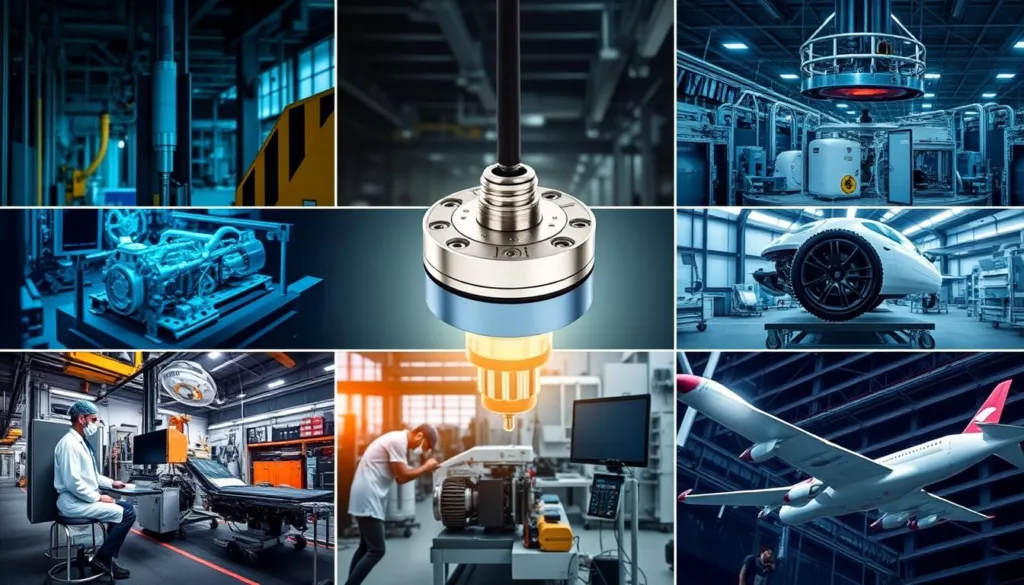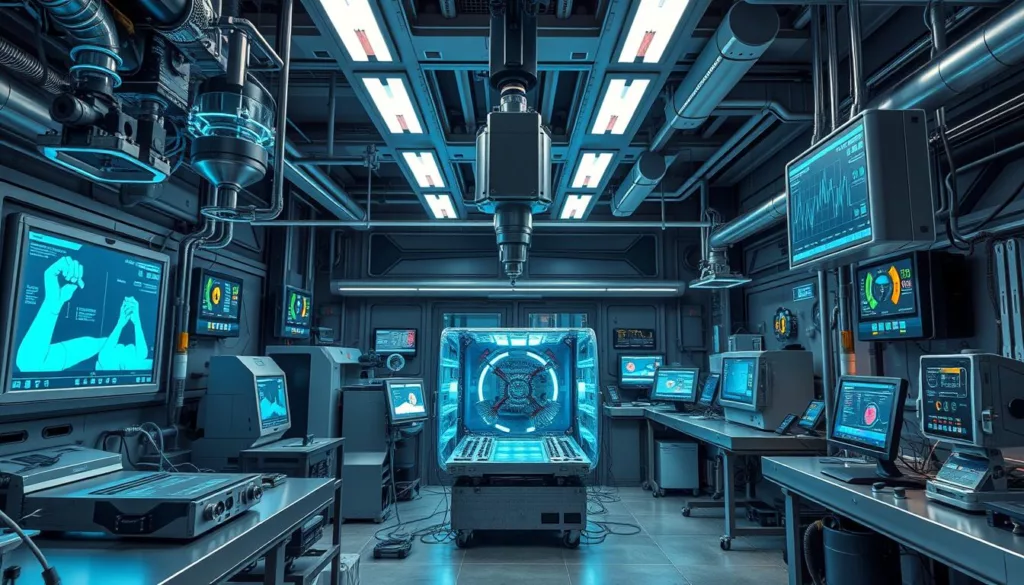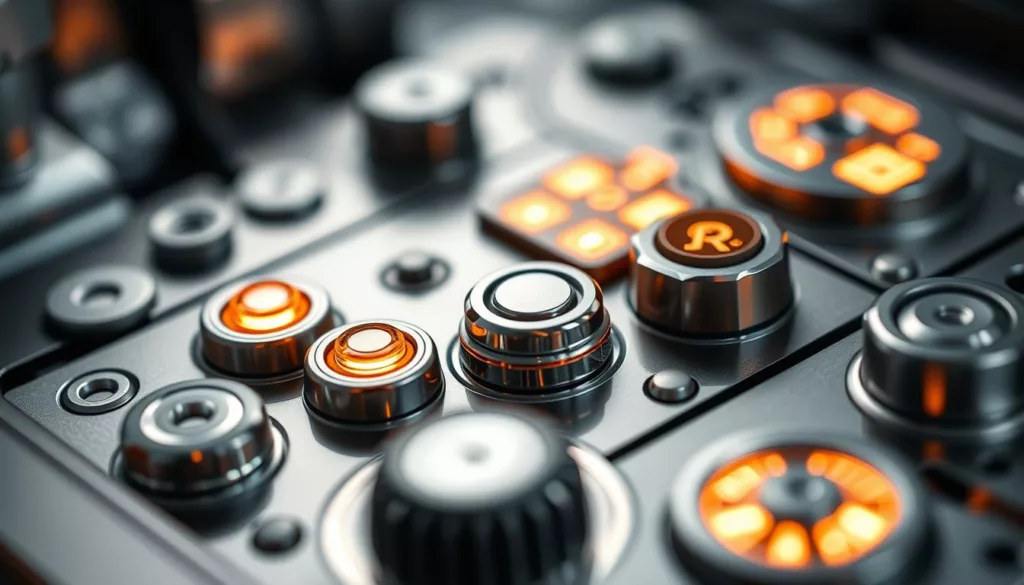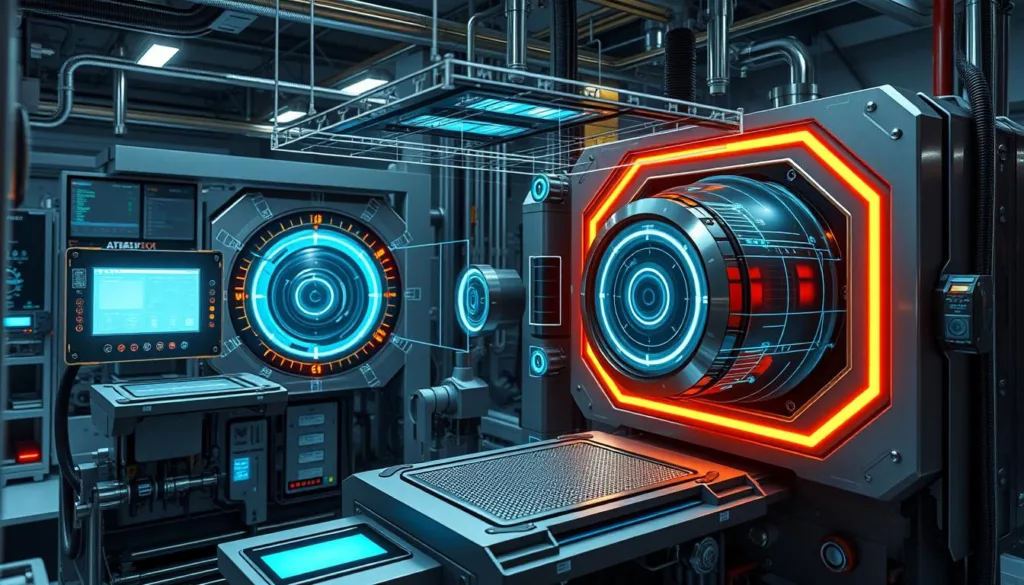We specialize in creating high-quality custom force sensor solutions for different industries. Our goal is to improve performance with precision and reliability. We make specialized force measurement solutions for each industry.
In a world where precision matters, our custom load cell sensors give accurate readings. They work well under different conditions. This shows our skill in making force measurement devices for various needs. It helps our clients make better decisions with precise measurements.
Key Takeaways
- Custom force sensor solutions enhance operational efficiency.
- Specialized force measurement solutions cater to unique industry needs.
- Accurate measurements are key for good decision-making.
- Industry-specific force measurement devices ensure reliability in diverse conditions.
- Our expertise supports tailored solutions for various applications.
Understanding Force Sensing Technologies
Force sensing technologies are key in many fields, giving precise measurements for industrial processes. Knowing the different types of force sensors helps choose the right ones for each need. We see several main types of industrial force sensors, each made for specific uses.
Types of Force Sensors
There are various force sensors, each with its own benefits. They cater to different needs:
- Strain Gauge Sensors: These measure how much an object bends when force is applied.
- Piezoelectric Sensors: These use special materials to create an electric charge when force is applied.
- Capacitive Sensors: They notice changes in capacitance when force is applied, making them very sensitive.
- Load Cells: Often in scales, load cells turn force into an electrical signal for precise measurements.
How Force Sensors Function
Force sensors change mechanical forces into electrical signals. The way they work depends on the sensor type:
| Sensor Type | Operating Principle | Key Applications |
|---|---|---|
| Strain Gauge Sensors | Measures strain on materials via resistance change | Structural engineering, robotics |
| Piezoelectric Sensors | Generates charge in response to mechanical stress | Impact force measurements, vibration testing |
| Capacitive Sensors | Detects changes in capacitance with applied force | Precision force measuring, material testing |
| Load Cells | Converts force into an electrical signal | Weighing scales, industrial automation |
Using advanced precision force sensing solutions boosts accuracy in many industrial areas. This leads to better efficiency and reliability. Knowing how each sensor works helps make the best choices for different tasks.
Applications of Custom Force Sensors in Various Industries
Custom load cell sensors are key in many industries. They bring innovation and efficiency with their specialized force measurement solutions. They fit the needs of different sectors, from healthcare to aerospace and manufacturing. Here are some main uses that show their value.
Healthcare Sector
In healthcare, custom force sensors improve patient care and work efficiency. They help with:
- Patient monitoring systems, giving accurate data for better health checks.
- Surgical tools, giving reliable force feedback for precise surgery.
- Prosthetics, making tailored solutions for each patient.
Aerospace and Defense
The aerospace and defense fields use special force measurement devices for safety and performance. They are used for:
- Checking the health of structures under stress.
- Testing aircraft parts to ensure they meet safety standards.
Manufacturing and Automation
In manufacturing and automation, custom load cell sensors boost productivity with accurate measurements. They offer:
- Exact force feedback in robots, cutting down on production errors.
- Improving quality control by giving real-time data on machine performance.
Custom Force Sensor Solutions for Specific Industries
At XJCSENSOR, we know each industry has its own needs for force sensing. Our custom force sensor solutions offer many benefits over standard sensors. They improve accuracy, reliability, and performance, making industries more efficient.
Advantages of Customization
Custom force sensor solutions for specific industries solve complex challenges. They ensure devices work at their best. Here are the main benefits:
- Improved accuracy: Our tailored solutions give precise measurements, key for healthcare and manufacturing.
- Enhanced reliability: Custom sensors are made to handle each industry’s specific conditions, lowering failure risk.
- Increased efficiency: Bespoke force sensing technology makes processes smoother, boosting productivity.
Case Studies in Specific Industries
We’ve created many success stories with our custom force sensor solutions. Here are a few:
- Automotive: Our tailored force sensors improve safety in vehicles, giving accurate data for braking and collision detection.
- Logistics: Custom solutions enhance load monitoring, ensuring safety in transport and storage.
- Healthcare: Our bespoke technology supports advanced medical devices, where precision is essential for patient safety and treatment success.
For more details on our custom force sensor offerings, visit this page.
Choosing the Right Force Transducer Technology
Choosing the right force transducer technology is key for accurate and reliable results in many industries. Each type of sensor has its own strengths and uses. Knowing these differences helps make the best choice.
Comparing Various Force Transducer Types
There are many force transducer technologies, each with its own design and use. Here’s a look at some common ones:
| Transducer Type | Operating Principle | Typical Applications | Advantages |
|---|---|---|---|
| Strain Gauge | Measures deformation | Manufacturing, testing | High accuracy and sensitivity |
| Piezoresistive | Pressure change leads to resistance variation | Medical devices, robotics | Good dynamic response |
| Capacitive | Changes in capacitance due to force | Precision scales, automotive | Very low drift over time |
| Optical | Light transmission altered by strain | Aerospace, harsh environments | Immune to electromagnetic interference |
Factors Influencing Selection
Several important factors influence the choice of force transducer technology:
- Application Requirements: The specific needs of your industry will guide your choice.
- Environmental Conditions: Things like temperature and humidity can impact sensor performance.
- Desired Accuracy: The level of precision needed will affect your decision.
- Budget Constraints: Cost is a big factor, too, when choosing for large-scale use.
Precision Force Sensing Solutions
Accurate measurements are key to success in many fields. Our precision force sensing solutions help organizations rely on their data. This leads to better decisions and higher productivity.
The Role of Accuracy in Measurements
Getting measurements right is vital for success. Our precision force sensing solutions help by reducing errors. Custom load cell sensors are made to fit specific needs, ensuring top performance.
Calibration Techniques
Keeping sensors calibrated is critical for accurate measurements. Using strong calibration methods boosts accuracy and extends equipment life. Regular checks help custom load cell sensors stay precise and reliable.
| Calibration Technique | Description | Benefits |
|---|---|---|
| Static Calibration | Measurement of sensor response using known force values. | High accuracy verification and baseline establishment. |
| Dynamic Calibration | Evaluation of sensor performance under varying loads. | Ensures reliability in real-world conditions. |
| Software Calibration | Utilization of software algorithms to adjust sensor outputs. | Quick adjustments and real-time monitoring. |
Bespoke Force Sensing Technology
Bespoke force sensing technology lets companies make force sensor solutions that fit their needs. It boosts performance and works well with current systems. This way, companies can solve problems that standard products can’t.
Benefits of Bespoke Solutions
- Enhanced Performance: Custom solutions make things more accurate and quick to respond, based on what each company needs.
- Improved Compatibility: These tailored solutions fit right in with what companies already use, making things run smoother.
- Address Unique Challenges: They’re made to solve specific problems in different fields.
Examples of Custom Technologies
Many industries like bespoke force measurement solutions because they’re flexible and precise. Here are some examples:
| Industry | Custom Application | Benefits |
|---|---|---|
| Healthcare | Pressure sensors for medical devices | Ensures patient safety and accurate readings |
| Aerospace | Load cells for aircraft testing | Enhances safety through precise measurements |
| Manufacturing | Force transducers for robotic arms | Improves automation efficiency and reduces errors |
Challenges in Industrial Force Sensor Implementation
Adding force sensors to industrial settings is complex. One big challenge is making them work with current systems. Problems with compatibility can mess up processes and reduce the benefits of these sensors. It’s key to solve these issues to make systems work better with new sensing tech.
Integration with Existing Systems
Making force sensors fit with today’s systems is vital. Several things need to be considered:
- Compatibility: Finding sensors that match existing setups is key.
- Data Coordination: Making sure data formats and communication protocols are the same is important for smooth data flow.
- Training: Teaching staff about new systems is necessary to avoid problems.
Cost Considerations
When thinking about adding industrial force sensors, cost considerations are important. A detailed look should include:
- Initial Investment: The cost of buying and setting up sensors is high and should be part of the budget.
- Long-Term Savings: Even though starting costs are high, savings from better efficiency and less downtime can make up for it.
- Maintenance Costs: Keeping the sensors running well is important for the total cost of the system.
Future Trends in Custom Load Cell Sensors
The world of custom load cell sensors is changing fast. New technologies are leading this change. They make the sensors work better and open up new uses in many fields.
Emerging Technologies
New ideas are changing what custom load cell sensors can do. Some key technologies include:
- Wireless Sensor Networks: These networks let data flow freely, without cables. This makes it easier to place sensors anywhere.
- IoT Integration: The Internet of Things connects sensors to big networks. This means data can be collected and analyzed in real time.
- Advanced Materials: New materials make sensors last longer and work better. They can handle tough environments.
- Machine Learning: Adding machine learning lets sensors predict and make smarter choices.
Predictions for Industry Growth
Experts think the custom load cell sensor market will grow a lot. This growth is driven by:
- More use of automation in making things.
- Need for accurate measurements in healthcare and space.
- Interest in sensors that save energy and are small.
- Value of being able to monitor things in real time.
| Trend | Impact |
|---|---|
| Wireless Sensor Networks | Enhanced flexibility and easier deployment. |
| IoT Integration | Improved data accessibility and analysis. |
| Advanced Materials | Increased durability in harsh conditions. |
| Machine Learning | Smarter operational efficiency and predictive capabilities. |
The mix of these new technologies is expected to drive growth in the custom load cell sensor market. It shows a bright future for innovation and new uses.
Choosing the Right Partner for Custom Force Sensor Solutions
Finding the right partner for custom force sensor solutions is key to success. It’s all about the criteria for selecting a supplier. This includes their technical skills, service offerings, and support commitment. Knowing these criteria helps professionals choose the best suppliers.
Criteria for Selecting a Supplier
- Technical expertise and deep industry knowledge are essential. Look for partners who understand force sensor technologies well.
- A supplier’s history of delivering high-quality solutions matters a lot. Success in past projects shows they can deliver.
- Commitment to customer support and after-sales service is important. Suppliers that offer ongoing help ensure challenges are solved quickly.
The Importance of Support and Service
Quality support and service make using custom force sensor solutions better. A responsive and knowledgeable supplier leads to lasting partnerships. This encourages innovation and problem-solving.
- They help solve problems fast, reducing downtime.
- They offer expert advice on best practices and strategies.
- They improve sensor solutions as project needs change.
Considering these factors can greatly improve project results. It makes custom force sensor solutions more effective.
Conclusion
Industry-specific custom force sensor solutions are key to improving performance in many sectors. We focus on precision, reliability, and custom tech to meet our clients’ needs. Our experience helps businesses keep up with changing industry demands.
We help companies get the most out of their force sensing tech. Our expert advice and support lead to innovation and better performance. Our goal is to help businesses succeed with the latest technology.
Learn more about our services and how they can help your success at custom force sensor solutions for specific. Let’s work together to advance force measurement tech and boost your operations.





